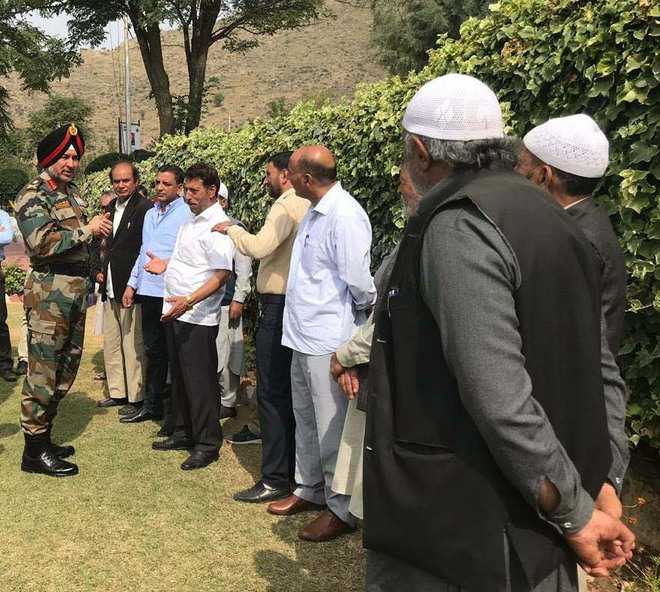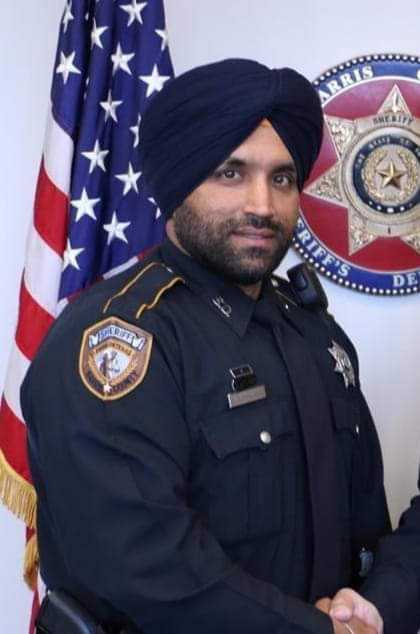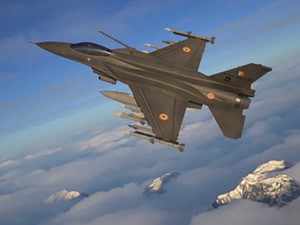












Our Correspondent
Jammu, September 20
To review the prevailing security situation, Lt-Gen Ranbir Singh, General Officer Commanding-in-Chief, Northern Command, visited the Kashmir valley on Friday.
The General was accompanied by Chinar Corps Commander, Lt Gen KJS Dhillon who visited formations and units in the hinterland and Line of Control (LoC). He was briefed on the counter-terrorist operations undertaken in the hinterland and the measures taken by the Commanders on ground to ensure safety and well-being of the people.
He was apprised of the atrocities being committed by the terrorists against innocent civilians. He also interacted with people from all walks of life and took a firsthand review of the prevailing situation in the valley and on the Line of Control.
The Army Commander was briefed by the Commanders on ground about the counter infiltration grid and the befitting response being given to the enemy on ceasefire violations. The Army commander lauded the alertness, bravery and motivation of the troops in discharging their duties.
He also commended the exemplary synergy among all security forces and the civil administration.He reinforced the need to be fully prepared to defeat the enemy designs.

I had developed a sore eye during the course of the war. After the ceasefire, I decided to consult a doctor. Since our medical facilities hadn’t yet been set up, I went to the Pakistani military hospital in Dacca on December 18, 1971.
The Registrar, a Punjabi Major, was genial and friendly. As I was waiting for the ophthalmologist to be free, he ordered tea and we engaged in general conversation. On learning that I too hailed from erstwhile Punjab (now Haryana), and that my father had a gallantry award land grant in Montgomery, Pakistan, he seemed to warm up even more. Our conversation covered the usual military topics: accommodation, schooling, salaries, etc. Conspicuously, there was no talk of the war. Assuming that he wanted to avoid the embarrassment of the vanquished, and conscious of the universal admiration the victorious Indian Army had since acquired, I too kept away from the subject.
When the ophthalmologist got free, the Registrar gave me a ‘see you later’ handshake and sent a staff member to guide me to the department. He had already told the doctor on telephone that he was sending a special case.The eye specialist was more serious. He was also a thorough professional. After peeping into my eye with a pencil beam and having made me read wall charts through different lens combinations, he luckily found nothing more serious than an infection. Handing me a bottle of eye drops, he said reassuringly that my eye would be perfectly fine. Just to lighten the atmosphere, I jokingly said, “Thank you doctor, whenever we fight next, I will be able to shoot better.” But the humour failed to elicit any change in his somewhat wooden demeanour.
The telephone connection to India had reportedly been established. On return to the Registrar’s office, I asked him to book a call to Delhi, which he promptly did. I waited and further conversation followed, now also covering a larger canvas about our respective countries. Still there was no talk of war.
Soon it was time for lunch. Their officers’ mess had closed and the food was to come from the ‘langar’ — the soldiers’ cook house. All other doctors also assembled in his office and the Registrar made introductions. They customarily thanked me for accepting their invitation to join them for lunch. The menu comprised large and thin roomali rotis and some delicious dal. The conversation flow was easy, with the Registrar being the lead talker.
It was now past 2:30 pm. There seemed no chance of the call materialising. The Registrar had enquired from the operator in the interim to learn that the call was still in queue. I thanked my hosts and got up to leave. It was then that the Registrar first spoke of war. There was no bitterness or rancour and the words seemed to come deep down from his heart.
“Major Sahib,” he said in a matter-of-fact manner without being squeamish, “we are doctors and none of us fought at the front. We, therefore, do not know who won and who lost.” He looked around at others, who nodded in agreement. “But seeing the behaviour of the Indian Army, I have no doubt that we have lost the war.”
He gave me a warm parting hug.
I was reminded of the truism — while battles are won or lost fighting through minefields and barbed wire entanglements, a war is won in the mind.

Sandeep Singh Dhaliwal, Harris County Sheriff’s deputy, was shot while conducting a traffic stop, Sheriff Ed Gonzalez said.
Dhaliwal, who was in his early 40s, was the first police officer in Texas to serve while keeping his Sikh articles of faith, including a turban and beard.Gonzalez said Dhaliwal, a 10-year veteran of the department, stopped a vehicle with a man and woman inside and one of them got out and shot him “ambush-style” at least twice in a “ruthless, cold-blooded way.” The shooter was seen running to a shopping centre nearby, officials said.
Investigators were able to identify what the shooter looked like by watching Dhaliwal’s dashcam video.
“They immediately looked at his dashcam to see what the suspect looked like, they took a photo of the suspect on the scene with their phone and immediately got that out to our intel people,” Gonzalez said.
The vehicle the shooter was driving was found and is being investigated, officials said.
The gunman and the woman were taken into custody, they said.
Dhaliwal was married and a father of three children.
“Deputy Sandeep Dhaliwal was a trailblazer. He was an example for many. He represented his community with respect and pride,” said Commissioner Adrian Garcia.
“Deputy Dhaliwal is known to everybody as someone with a giving heart,” Gonzalez said. “Post (Hurricane) Harvey, when we needed the help most, he brought an 18-wheeler of people that he gathered together, that came all the way from California to deliver goods to our community.”
Since 2015, Dhaliwal was the “history-making” police officer in Texas to serve while keeping his Sikh articles of faith. He was allowed to wear the turban and beard while patrolling the streets in order to bolster cultural diversity.
With this policy, one of the largest sheriff’s offices in the country had affirmed that a person does not have to choose between their faith and a career of service. Since 9/11, misperceptions about Sikhs’ religiously mandated turbans and beards have led to an increase in discrimination against the community.
Policy changes like that at the Harris County Sheriff Office and other law enforcement agencies across the country aim to combat this stigma while also giving qualified men and women a chance to serve the community.
Dhaliwal worked with United Sikhs, a global humanitarian relief and advocacy nonprofit, to help organize the donation of truckloads of supplies for first responders after Harvey. – PTI

NEW DELHI: Lockheed Martin will begin supplying wings for its F-16 combat jets from a facility in southern India from next year, a senior executive said on Thursday.
Lockheed is bidding for a contract, estimated at more than $15 billion, to supply the Indian Air Force with 114 combat planes and has offered to shift its F-16 production line from the United States to India. It plans to build an upgraded version of the aircraft which it calls F-21.
During the recently held ex – servicemen’s rally at Nagpur, Lt Col MP Deshpande (Retd) was felicitated by Shri Ashwin Mudgal IAS Collector and District Magistrate Nagpur for his contribution towards motivating and guiding the youth to join the armed forces of India. Since 2007, Lt Col MP Deshpande of ‘The Forces Foundation’ assisted by his wife Mrs Sphurti Deshpande are committed to train the armed forces aspirants and more than 250 candidates groomed by them have cleared various entrance exams and SSB Interviews for various military academies. During the rally held on 16 September 2019, Shri Ashwin Mudgal shared his memorable experiences while undergoing attachment training with the Army formations in Arunachal Pradesh and lauded the contributions of ex – servicemen towards the betterment of society

The Indian Army is examining a proposal to allow civilians to visit the world’s highest battlefield, the Siachen glacier, to gain first-hand experience of the tough conditions in which soldiers operate, two senior army officers said on Tuesday.
Mooted by army chief, General Bipin Rawat, the proposal to give civilians access to the glacier is at an initial stage but is being considered seriously, one of the officers cited above said on condition of anonymity.
Siachen is strategically important because so long as it is in India’s control, the Pakistani army can’t link up with the Chinese and pose a threat to Ladakh. It acts as a wedge between the Shaksgam Valley under Chinese control and Baltistan, which is occupied by Pakistan.
“We are examining how the proposal can be implemented, the logistics involved and areas that can be opened to the public. We are looking at the possibility of allowing people to visit the Siachen base camp and some nearby posts,” said the second officer, asking not to be named. Since 2007, the army has been conducting a civilian trek to the Siachen glacier every year.
India, which spends Rs 5 to Rs 7 crore daily on guarding the glacier, has deployed around 3,000 soldiers at Siachen, where temperatures can drop to minus 60 degrees Celsius. More than 1,000 soldiers have died guarding the area since the army took control of the inhospitable glacier in April 1984, almost twice the number of lives lost in the Kargil war. While about 220 men have been killed in firing from the Pakistani side, the other casualties have been caused by extreme weather and treacherous terrain.
Guns have been silent on the glacier since the November 2003 ceasefire between India and Pakistan.
Experts welcomed the move to give civilians access to the glacier, stressing that it will give them a better understanding of India’s national security challenges.
“It will be a capability demonstration for the people of the country. They will appreciate how our brave troops are trained to fight in any kind of terrain and also the challenges they encounter daily,” said former Northern Army commander, Lieutenant General BS Jaswal (retd).
Soldiers have to trek for almost 28 days, covering a stretch of 128km to reach some of the farthest pickets on the glacier, one of the most desolate places on the planet.
Former army vice chief, Lieutenant General AS Lamba (retd), said the move will allow people to comprehend the complexities of guarding the country’s farthest frontiers at any cost. “It will also create a new sense of integration of these remote areas to the rest of the country,” Lamba added.
The Indian Army launched Operation Meghdoot in April 1984 to secure the glacier after the Pakistan army occupied the heights at Siachen, a 76km river of slow moving ice. Almost 80% posts on the glacier are located above 16,000 feet, with Bana towering above the rest at 21,753 feet.
Islamabad has made repeated demands for demilitarising the glacier, invoking long-term peace but India has taken a cautious approach on the sensitive issue. Several rounds of talks between India and Pakistan on demilitarising the glacier — a contentious issue in bilateral ties — have failed, with Islamabad refusing to authenticate troop positions on the ground.
Lahore, September 3
Pakistan Prime Minister Imran Khan announced that his government would issue multiple and on-arrival visas to Sikh pilgrims coming from India and abroad and provide them maximum possible facilities during their visit to the holy sites.
“I assure that you will be issued multiple visas… This is our responsibility. We will facilitate you rather will give you visas at airport,” The News International quoted Khan as saying on Monday while addressing the International Sikh Convention at the Governor House here.
“(We) will give you multiple visa to facilitate your journey,” he added.
The convention was attended by Punjab Governor Chaudhry Sarwar, federal and provincial cabinet members, and Sikh pilgrims from the UK, the US, Canada, Europe and other countries.
The Prime Minister said after coming into power, his government realized the difficulties faced by foreigners to get Pakistani visas intending to visit the country for pilgrimage or tourism.
“Though our government has changed the visa regime, the mindset of creating hurdles will gradually diminish,” he added.
Monday was the last day of the convention, which began on August 31, on the initiative of the Punjab Governor aimed at inviting suggestions regarding preparations for the 550th birth anniversary celebrations of Guru Nanak Dev, the founder of Sikhism, at the gurdwara in Kartarpur Sahib in November.
Indian Sikh pilgrims along with thousand others from across the world will visit the gurdwara in Pakistan’s Punjab province, where Guru Nanak Dev spent his final days.
Our Correspondent
Kathua, September 23
Soldiers of the Territorial Army today recovered about 40 kg of gunpowder from Dewal village in Billawar subdivision of the district.
The gunpowder was recovered from a house. The owner of the house was not at home at the time of the search and recovery. The Army, however, has detained his wife for questioning.
According to sources, Army jawans cordoned off the house of Khalil Ahmed in Dewal village and after searching the house recovered about 40 kg of gunpowder.
Khalil Ahmed originally belongs to Kindley village of Macheddi tehsil but presently residing in Dewal village, where he has constructed a new house.
Sources said Khalil Ahmed was a contractor and had been providing labour to industries outside the state.
The recovery of a huge amount of gunpowder has raised many questions with the Army looking at various angels.
A Defence spokesperson said, “We had specific information about the explosive and after that we searched the house of Khalil Ahmed and found two bags of 20 kg each full of gunpowder. The owner of the house, Khalil Ahmed, was not found in the house and his wife has been detained for questioning.”
Lt Gen Ranbir Singh, Northern Command chief, met Governor Satya Pal Malik here on Monday. He briefed the Governor about the overall security situation in the forward areas and hinterland of J&K and Ladakh and the anti-terrorist operations being conducted by the Army. The Governor called for continuing the current civil-police-Army collaboration and synergy in combating anti-terrorist activities. TNS

























































